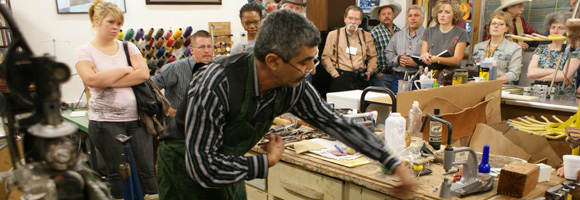
Maybe it's the smell of pencils and college-ruled paper in the air, but politicians in the U.S. are going positively education-crazy. Arne Duncan, education secretary, gave an interview and speech disclosing radical overhauls of our current "No Child Left Behind" policy. President Obama urged students to stay in school, and work hard to learn the skills that would help them compete in a global market. There is good reason that these important people are spending time and effort looking into the affairs of children. Simply put, we have problems to large, numerous, and long-term to be dealt with by the current generation of workers. The question is, how can you train a generation to fabricate a new future without giving them the tools of fabrication?
Fellow cottage industrialist Bre Pettis started a twitversation today asking "What would Industrial Revolution 2.0 look like?". Some of the interesting bits of the conversation unfolded around the potential of de-centralized production to eliminate child labor and sweat-shops. That got me to thinking, what happens when making is no longer tied to toxins, danger, and psychological death, the way it was in the factories of the first industrial revolution?
Don't get me wrong, an assembly line, or sweatshop is no place for a kid. There are real dangers in modern manufacturing: chemicals, high temperatures, crushing pressures and slicing speeds. And these pale in comparison to the psychological damage of loosing your childhood to the monotony of the factory. But a Humblefactory need not suffer from any of these problems. In fact, correctly structured and integrated into a community, a Humblefactory could be an amazing place to expose kids to learning. What's more this "classroom" would not only be more tangible and applicable to kid's lives, but would create graduates more able to fill the inventor/entrepreneur roles required by the complex problems of tomorrow.
In his "Pattern Language", Christopher Alexander wrote about "Shopfront Schools" -- an attempt at bringing real-world education back into schools at a time where he saw students being taught skills to far abstracted from the communities they lived within. If this was a problem during the late 1960s when Alexander was writing, then certainly we suffer even more extremely from the same issues. We teaching students more technical and abstract concepts in school: calculus, computer programming, chemistry, genetic biology in High school. We are also living in communities where a chance to see these skills in action is often not available -- programming, manufacture, and even finance have been relocated into low-wage overseas markets. Kids are encouraged to learn difficult skills with limited visible application in their community -- no wonder national high-school graduation rates are only 70% -- and as low as 50% in some inner cities.
Humblefactories within communities could give students tangible evidence that their educations will be valuable, and usable. More importantly, they can give students specific direction as to what to study, and encourage them to excel at their chosen field. And, if that weren't enough, incorporating site visits to real working Humblefactories would give students real community contacts to work with in summer jobs, internships, or long-term employment.
Certainly, we need to work on teaching our children new skills to compete in tomorrow's world. But we are deluding ourselves if we think that any amount of education can compete with similarly educated children who need half the salary to survive in some far away community. We can only prepare our children to compete in a future where there are jobs to compete in. Giving them the tools and technologies of Humblefacture is a start to making a local distributed economy with more real, viable jobs for them to aspire to.
|
0
comments
]








0 comments
Post a Comment